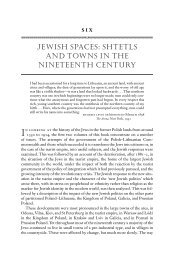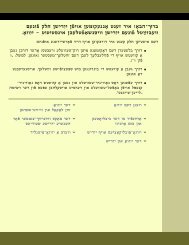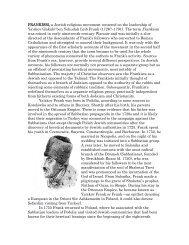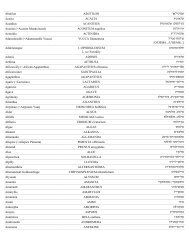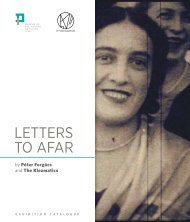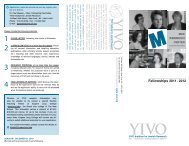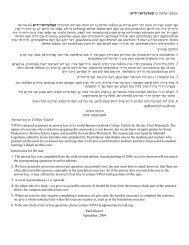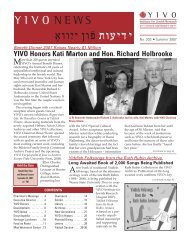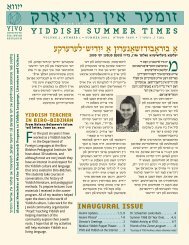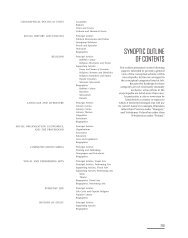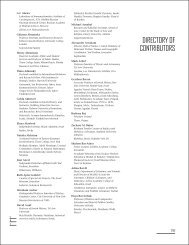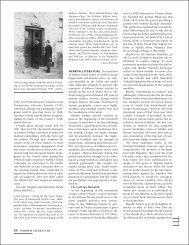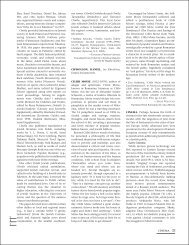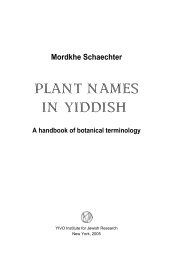geographical–political units - YIVO Institute for Jewish Research
geographical–political units - YIVO Institute for Jewish Research
geographical–political units - YIVO Institute for Jewish Research
Create successful ePaper yourself
Turn your PDF publications into a flip-book with our unique Google optimized e-Paper software.
Chaim Grade<br />
Yiddish poet and novelist Chaim Grade (1910–1982) ranks among the most important<br />
Yiddish writers of the post-Holocaust period. His unsentimental depictions of rabbinic<br />
high culture and life on the <strong>Jewish</strong> streets of Vilna both describe memorable characters<br />
drawn from different strata of society, and dramatize the contest of ideas and moral<br />
impulses that defined his community in the interwar period. Though today Grade is best<br />
remembered <strong>for</strong> the richness of his prose, he is also the author of nine volumes of poetry.<br />
Grade was born in Vilna, where his father, an outspoken maskil (enlightener) and<br />
Hebraist who clashed with the rabbinic authorities, died when Chaim was a young boy.<br />
The writer’s mother, Vella, who is the heroine of many of his poems and stories, sold apples<br />
in the city’s alleys to eke out a living; she and Grade lived in poverty in a blacksmith’s<br />
cellar. Beginning at the age of 13, Grade was shuffled between various outposts of the<br />
Novaredok Musar yeshiva, receiving a particularly extreme <strong>for</strong>m of religious education<br />
that strove to educate the moral personality through self-abnegation and intense selfanalysis.<br />
Though Grade excelled as a student, he was denounced <strong>for</strong> secretly reading<br />
secular literature and <strong>for</strong> trying his hand at poetry. He was also deeply influenced by his<br />
experience as a student of Avraham Yesha‘yahu Karelits, better known as Ḥazon Ish, the<br />
outstanding Talmudic scholar who was beloved in Vilna due to his scholarship, modesty,<br />
and compassion. Much of Grade’s later writing negotiates his conflicted allegiances to<br />
the models of his maskilic father and orthodox teachers.<br />
At age 22, Grade abandoned his studies to embark on a career as a secular poet. This<br />
sudden shift away from the extreme moral education of the Musar movement provoked<br />
constant introspection. He wrote in one lyric, “I see in my weakness the pain of my<br />
generation and its shame.” Grade soon found companionship and inspiration within the<br />
ranks of Yung-Vilne (Young Vilna), a Yiddish literary group that sought to synthesize<br />
secular <strong>Jewish</strong> culture, progressive politics, and influences from world literature. His<br />
breakthrough came with the publication of Yo (Yes; 1936), a volume that included<br />
intimate lyrics about his family (his mother is held up as a model of pious devotion),<br />
leftist political lyrics, metapoetic works that explore his poetic calling, and the cycle<br />
Ezekiel that attracted attention <strong>for</strong> its apocalyptic prophetic voice. The volume’s title<br />
poem was an act of defiance designed to proclaim the poet’s creative independence from<br />
clerical coercion by his adoption of an entirely new affirmative vocabulary: “Yes! That is<br />
the answer of my youth when it needs to escape from its own skin. . . .”<br />
The epic narrative poem Musernikes (Musarists; 1939) explored the education of<br />
1



